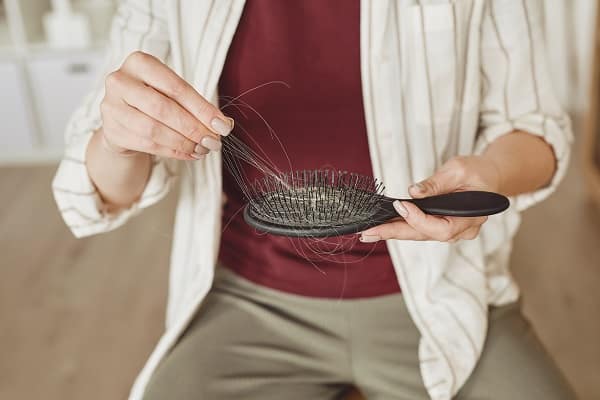Hair loss, a concern that affects millions globally, is more than just an aesthetic issue. For many, it’s deeply intertwined with self-esteem, identity, and overall well-being. As the prevalence of hair loss continues to rise, understanding its root causes and finding effective solutions becomes paramount. This article delves into the intricacies of hair loss, offering insights into its causes, the role of diet, essential hair care habits, medical interventions, natural remedies, and the psychological implications. By the end, readers will have a holistic understanding and actionable tips to combat this pervasive issue.
Contents
- Understanding Hair Loss
- The Role Of Diet In Hair Health
- Hair Care Habits To Adopt
- Medical Treatments And Procedures
- Natural Remedies And Home Solutions
- The Psychological Impact Of Hair Loss
- Prevention Is Better Than Cure
- Hair Loss Myths Debunked
- Exploring The Link Between Stress And Hair Loss
- The Bottom Line
- Related
Understanding Hair Loss

Hair loss, scientifically termed alopecia, is the thinning or complete absence of hair in areas where it normally grows. It’s essential to differentiate between hair thinning, a natural process that can intensify with age, and balding, which can result from various factors.
The causes of hair loss are multifaceted. While genetics play a significant role, other factors such as hormonal imbalances, specific medical conditions, medications, and stress can contribute. Recognizing the underlying cause is the first step toward effective intervention.
The Role Of Diet In Hair Health

One’s diet plays a pivotal role in overall hair health. Nutritional deficiencies can directly impact the hair’s vitality, leading to thinning or even hair loss. For instance, a deficiency in iron or biotin can significantly affect hair growth and strength.
Incorporating specific foods into one’s diet can promote hair health. Foods rich in omega-3 fatty acids, like salmon and flaxseeds, nourish the hair. Similarly, protein-rich foods such as eggs, beans, and lean meats are essential for hair strength and growth. A balanced diet is, therefore, a cornerstone of healthy hair.
Hair Care Habits To Adopt

Hair, like any other body part, requires tender love and care. Adopting gentle hair care practices can prevent unnecessary breakage and thinning. This includes avoiding excessive heat styling, harsh chemical treatments, and even being gentle while brushing or combing.
Protection is another crucial aspect of hair care. Just as the skin needs protection from harmful UV rays, so does the hair. Wearing hats or scarves, especially during peak sun hours, and using heat protectant sprays before styling can go a long way in preserving hair health.
Medical Treatments And Procedures

For those experiencing significant hair loss, medical interventions might be the way forward. Over-the-counter solutions like Minoxidil have shown promise in promoting hair growth. However, consulting with a dermatologist before starting any treatment is essential.
On the more advanced end, procedures like hair transplants, laser therapy, and Platelet-Rich Plasma (PRP) treatments offer hope for those looking for more permanent solutions. These procedures, while effective, require thorough research and consultation with professionals to determine suitability.
Natural Remedies And Home Solutions

Nature offers a plethora of remedies that can aid in combatting hair loss. Essential oils, for instance, have been used for centuries to promote hair health. When massaged into the scalp, oils like rosemary and lavender can stimulate hair follicles and promote growth.
Home treatments, like DIY masks, also offer benefits. Ingredients commonly found in kitchens, like eggs and aloe vera, can create nourishing masks. Regularly applying these natural remedies can lead to healthier, stronger hair.
The Psychological Impact Of Hair Loss

Hair loss isn’t just a physical phenomenon; it carries significant psychological implications. For many, hair symbolizes youth, vitality, and identity. Losing it can lead to a decline in self-esteem and confidence, affecting various facets of life.
It’s essential to address these psychological impacts. Seeking support, be it through friends, support groups, or professional therapy, can be beneficial. Remember, it’s okay to seek help and lean on others during challenging times.
Prevention Is Better Than Cure

Early detection of hair loss can make a world of difference. Recognizing the signs and seeking timely intervention can prevent further deterioration. Regularly checking for unusual hair thinning or bald patches is a good practice.
Lifestyle choices also play a crucial role in hair health. Managing stress, avoiding excessive alcohol and smoking, and maintaining a balanced diet can prevent many hair-related issues. As the adage goes, prevention truly is better than cure.
Hair Loss Myths Debunked

The world of hair loss is riddled with myths and misconceptions. One common myth suggests that frequent shampooing can lead to hair loss. Another popular misconception is that wearing hats can cause balding.
It’s essential to separate fact from fiction. Scientific research and consultation with dermatologists can help debunk these myths, ensuring that individuals are not misled by baseless claims.
Exploring The Link Between Stress And Hair Loss
Stress, a ubiquitous part of modern life, has far-reaching effects on our health, and our hair is no exception. Chronic stress can lead to a condition known as telogen effluvium, where hair follicles are pushed into a resting phase, leading to increased hair shedding. This form of hair loss is temporary but can be distressing for those experiencing it. Additionally, stress can exacerbate other forms of hair loss, such as androgenic alopecia or alopecia areata, making it a significant factor to consider in the broader context of hair health.
Addressing stress-induced hair loss requires a two-pronged approach. Firstly, identifying and managing the sources of stress is crucial. This might involve seeking professional counseling, adopting relaxation techniques like meditation or yoga, or making lifestyle changes. Secondly, providing the hair with the necessary nutrients and care can help in its recovery. This includes a balanced diet, gentle hair care practices, and possibly incorporating hair growth-promoting treatments. By tackling both the root cause and its manifestation, one can effectively combat the effects of stress on hair health.
The Bottom Line
Hair loss, while common, is a multifaceted issue that requires a comprehensive approach. From understanding its root causes to adopting preventive measures, every step is crucial. Whether one chooses medical interventions, natural remedies, or a combination of both, the journey towards healthier hair is a personal one. Remember, while hair is an integral part of our identity, it doesn’t define us. With the right knowledge and tools, combatting hair loss becomes a more manageable endeavor.


